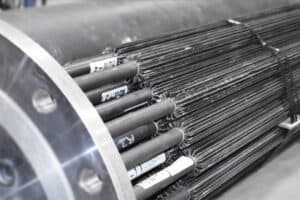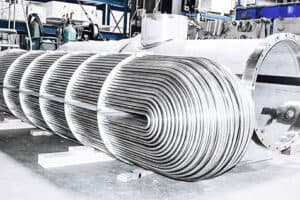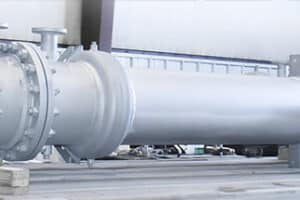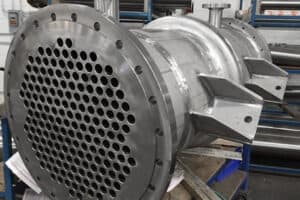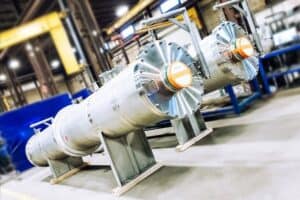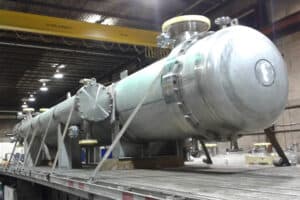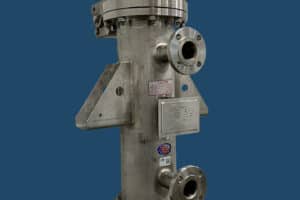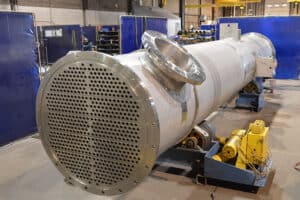
Industrial Shell & Tube Heat Exchangers
Enerquip’s industrial shell and tube heat exchangers deliver reliable, efficient performance in demanding applications — including ethanol and chemical processing, LNG refineries, asphalt heating, landfill gas cooling, and plastics recycling.
Our industrial exchangers can be built for the following heating and cooling duties:
- Vapor → Vapor or Liquid
- Liquid → Vapor or Liquid
- Hot Oil → Asphalt, Heavy Oils, or Steam
- Steam → Asphalt or Fuel Oils
And with the following options:
- Materials: Carbon steel, 304L/316L stainless, Duplex, Hastelloy, Alloy 20, Monel, AL-6XN, and titanium
- Sizes & Configurations: Up to 48” diameter, depending on weight
- Styles: Shell & tube, suction, bayonet immersion, pipe-in-pipe, hairpin, finned tube
- Designs: U-tube or straight tube, floating or double tube sheets
- Connections: Sanitary tri-clamp, ASME flanged, NPT threaded, or lap-joint fittings
- Finishes: Passivation, electropolish, polished surfaces for sanitary use, mill
- Compliance: ASME code, TEMA Classes C/B/R, PED & other international codes
- Simple Maintenance: Removable tube bundles, davit arms, inspection ports, O-rings, channel covers
- Accessories & Performance: Sight glasses, vacuum breakers, insulation jackets, annular distributors, mounting supports, expansion joints, twisted tape turbulators, and more
Common Industrial Applications for Shell & Tube Heat Exchangers
Water Heating – Hot water is vital for safety, sanitation, and operations. Shell & tube exchangers heat water by running it through the tube side while steam or thermal oil flows through the shell for efficient transfer.
Vapor Condensing & Reboiling – In refining and chemical processes, exchangers condense vapors into liquids for recovery and provide reboiler duty in distillation towers, maintaining efficiency and product quality.
Landfill Gas Cooling – Exchangers cool landfill gas before treatment or energy recovery. This step removes contaminants, protects downstream systems, and supports safe, efficient gas utilization.
Steam Generation – Many plants rely on exchangers to produce steam for heating, cleaning, or process use. They deliver safe, consistent steam supply through efficient thermal transfer.
Asphalt Heating – Asphalt must stay at pumping temperature for storage and application. Shell & tube exchangers provide precise, controlled heating that prevents energy loss and preserves quality.
Suction Heating – These heaters warm viscous fluids like asphalt or fuel oil as they’re pumped through. By heating only the product being drawn out, they cut energy costs, improve flow, and handle heavy fluids more efficiently.
Snow Melt Pits – Enerquip’s stainless steel coils, used in ice rinks across North America, circulate hot water or steam to melt ice shavings. Protective grates guard the tubes, and each coil is custom-fit for specific applications.
Oil Cooling & Heating – Exchangers manage oil temperatures in industries from chemicals to mining. Oil heaters use thermal oil when direct heating isn’t possible, while coolers reduce high fluid temps in closed-loop systems and machinery.
Process & Air Heating & Cooling – Exchangers regulate hydrocarbons, biogas, and calibration fluids, while preheating or cooling air in furnaces and dryers. This protects equipment, ensures product integrity, and reduces energy use.
Reverse-Engineered Replacements
Need a drop-in replacement? We can reverse engineer from old drawings, U-1 data reports, or even photos—helping you upgrade to longer-lasting, more corrosion-resistant materials while ensuring fit and performance.
Since 1985, Enerquip has specialized in American-made industrial and sanitary heating and cooling solutions for a broad range of industries. Contact us or request a quote today to find the right process solution for your operation.
Request a Quote >>


